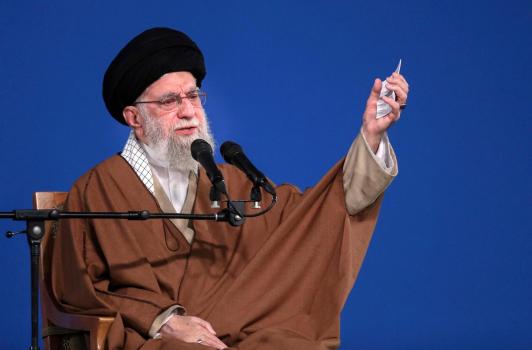By David Rising and Farroush Amiri
DUBAI, United Arab Emirates (AP) — In his first public remarks since a ceasefire was announced with Israel following a 12-day war, Iran’s Supreme Leader Ayatollah Ali Khamene said Thursday that his country had given America a slap in the face with its attack on an American base in Qatar and warned against any more U.S. attacks.
For the first time since June 19, Khamenei appeared on Iranian official television in a prerecorded video presentation. Speaking with a scratchy voice and occasionally stumbling over his words, the 86-year-old sounded and looked more worn out than he had just a week previously.
The supreme leader’s speech, which lasted over ten minutes, was full of threats and warnings aimed at Israel and the United States.
He played down Sunday’s U.S. assault on three Iranian nuclear sites with cruise missiles and bunker-buster bombs, claiming that U.S. President Donald Trump had overstated the attack’s impact when he said it totally and totally destroyed Iran’s nuclear program.
He said that they were unable to accomplish anything noteworthy.
Rafael Grossi, the director of the International Atomic Energy Agency and the head of the U.N. nuclear watchdog, said Thursday that the damage caused by U.S. and Israeli strikes on Iranian nuclear sites is quite significant.
Grossi told the French radio RFI, “I think annihilated is too much, but it suffered enormous damage.”
Esmail Baghaei, the spokesperson for Iran’s Foreign Ministry, acknowledged on Wednesday that there is no doubt that our nuclear installations have suffered significant damage.
Since seeking refuge in a covert location following Israel’s June 13 attack on Iranian nuclear facilities and targeting senior military leaders and scientists, Khamenei has not been seen in public.
Trump was able to assist in negotiating a ceasefire that went into force on Tuesday in response to the U.S. strike on Iran’s nuclear facilities on Sunday.
According to Khamenei, the United States only became involved in the conflict because it believed that the Zionist system would be completely overthrown if it didn’t.
He claimed that although it went to battle to save them, it came away empty-handed.
He claimed that his nation’s Monday strike on the American base in Qatar was noteworthy because it demonstrated that Iran has access to key American facilities in the area and is able to take action against them whenever it sees fit.
He claimed that the Islamic Republic had won and had slapped America in the face in vengeance, adding that this might be done again in the future.
According to him, the opponent will undoubtedly suffer greatly if there is any aggression.
Iran’s life has been progressively getting back to normal since the truce.
Shops in Tehran’s capital started to reopen Thursday, and traffic started to resume to the streets as Iran partially restored its airspace, which had been closed since the start of the conflict.
Iran has reopened the eastern half of the country’s airspace to both domestic and international flights, including those that are passing Iranian airspace, according to Majid Akhavan, spokesman for the Ministry of Roads and Urban Development.
Tehran reported earlier this week that 5,332 people had been injured and 606 people had died in the Iranian conflict. According to data provided Wednesday by the Human Rights Activists group in Washington, Israeli strikes on Iran may have killed at least 1,054 people and injured 4,476 more.
According to the group, which has released comprehensive death tolls from Iran’s several uprisings, 318 security forces and 417 civilians were among the dead.
According to Israeli officials, at least 28 people were killed and over 1,000 were injured.
Related Articles
-
Pentagon leaders double down on the destruction from US attacks on Iran
-
Today in History: June 26, US Supreme Court legalizes same-sex marriage
-
POWs, abductees, defectors and separated families are the legacy of the Korean War
-
Iranian-backed hackers go to work after US strikes
-
Not something to celebrate : As it turns 80 and faces dwindling global clout, can the UN survive?
According to new figures issued by Israeli officials on Thursday, Iran fired almost 550 missiles at Israel throughout the 12-day conflict, with a 90% interception rate. Israel, meanwhile, claimed to have struck eight locations linked to nuclear and more than 720 targets related to Iranian military facilities.
There is cautious optimism for a longer-term peace because Trump has also stated that U.S. and Iranian officials will speak next week.
Although U.S. Mideast envoy Steve Witkoff has stated that direct and indirect communication has occurred between the two nations, Iran has not admitted that any such discussions will occur. Following Israel’s June 13 attack on Iran, a sixth session of U.S.-Iranian talks that had been planned for earlier this month in Oman was canceled.
Iran has maintained that its nuclear program will not be abandoned. Its parliament decided Wednesday to expedite a plan that would essentially end the nation’s cooperation with the IAEA, which has been monitoring the program for years, in a decision that highlighted the difficult road ahead.
This article was written by Natalie Melzer in Nahariya, Israel, and John Leicester in Paris for the Associated Press.








